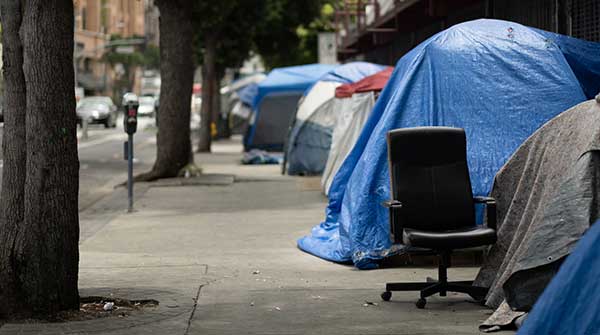The people are hungry and sleeping outside. Where are Canada’s premiers?
 In days of old, kings and queens were often judged by some pretty basic criteria: Did the people have enough to eat? Did they have a safe, warm place to lay their heads at night?
In days of old, kings and queens were often judged by some pretty basic criteria: Did the people have enough to eat? Did they have a safe, warm place to lay their heads at night?
Looking around Canada today, it’s pretty clear that our elected leaders wouldn’t pass these simple tests. Food bank use is at record levels. Practically every city has a tent city, populated by people who can’t find – or can’t afford – a bed indoors.
Your local radio station may be playing Andy Williams singing “It’s the Most Wonderful Time of the Year,” but for too many people, it’s not: winter is the hardest time. And with very few exceptions, Canada’s premiers, snug in their beds, don’t seem to see it. Or if they do, they don’t seem to care.
In recent years, Canadians have seen the federal government take concrete steps to reduce poverty. For example, Ottawa introduced the Canada Child Benefit in 2016 and passed the Canada Disability Benefit Act in 2023. The former has cut poverty for children and families across the country. When implemented, the latter will do the same for Canadians with disabilities.
These are essential programs that improve the lives and prospects of millions. But it’s possible that such measures have an unintended side effect: they may let Canada’s premiers off the hook.
With the feds putting money into income supports, child care, and dental care, it’s easy to think frontline services are a federal responsibility. They are not. In Canada’s loose federation, it’s up to the provinces to regulate housing and pay for health care, schools, social services, and more.
Federal investment in these areas is always welcome. But provincial investment is absolutely essential.
Fast-rising food and housing costs have taken a big bite out of most Canadians’ household budgets, and the lower your income, the more inflation hurts. For those already experiencing poverty, higher costs aren’t just bad – they are catastrophic.
Provincial governments can do something about it.
Ninety-four percent of jobs in Canada are provincially regulated, which means minimum wage rates and other workplace rules are primarily a provincial matter. So is the regulation of rental housing. Social assistance rates are set by the provinces, too. Higher minimum wages, real rent controls, and higher social assistance rates could go a long way toward getting people through the winter – and beyond.
This past summer, a study by the Canadian Centre for Policy Alternatives found that minimum wages in all 10 provinces were too low to cover average rents on a one-bedroom apartment. Of 37 cities examined across the country, only three – all in Quebec – offered one-bedroom apartments that a minimum-wage earner could afford. Minimum wages would have to rise by anywhere from $2.52 an hour (in Quebec City) to $16.71 an hour (in Vancouver) to make a one-bedroom unit affordable for a minimum-wage worker.
Minimum wages are far too low – everywhere.
Meanwhile, low social assistance rates don’t lift people out of poverty – they lock them into it. Research by the Maytree Foundation found that social assistance rates in all provinces in 2022 kept people below Canada’s official poverty line with only one exception: in Quebec, a couple with two children could escape poverty by combining social assistance with the Canada Child Benefit and other payments.
In 2022, most social assistance recipients across Canada were not just living in poverty but in deep poverty, which is exactly as bad as it sounds. Households in Quebec and Prince Edward Island were slightly better off, but deep poverty was the norm for social assistance recipients in every other province.
So what have our premiers done for the people lately?
Good question. Here’s what we know for sure: Whatever they’ve done, it hasn’t reduced food bank use. It hasn’t made our tent cities any smaller. And it hasn’t kept people warm.
Not even at the most wonderful time of the year.
Randy Robinson is Ontario director of the Canadian Centre for Policy Alternatives.
For interview requests, click here.
The opinions expressed by our columnists and contributors are theirs alone and do not inherently or expressly reflect the views of our publication.
© Troy Media
Troy Media is an editorial content provider to media outlets and its own hosted community news outlets across Canada.


